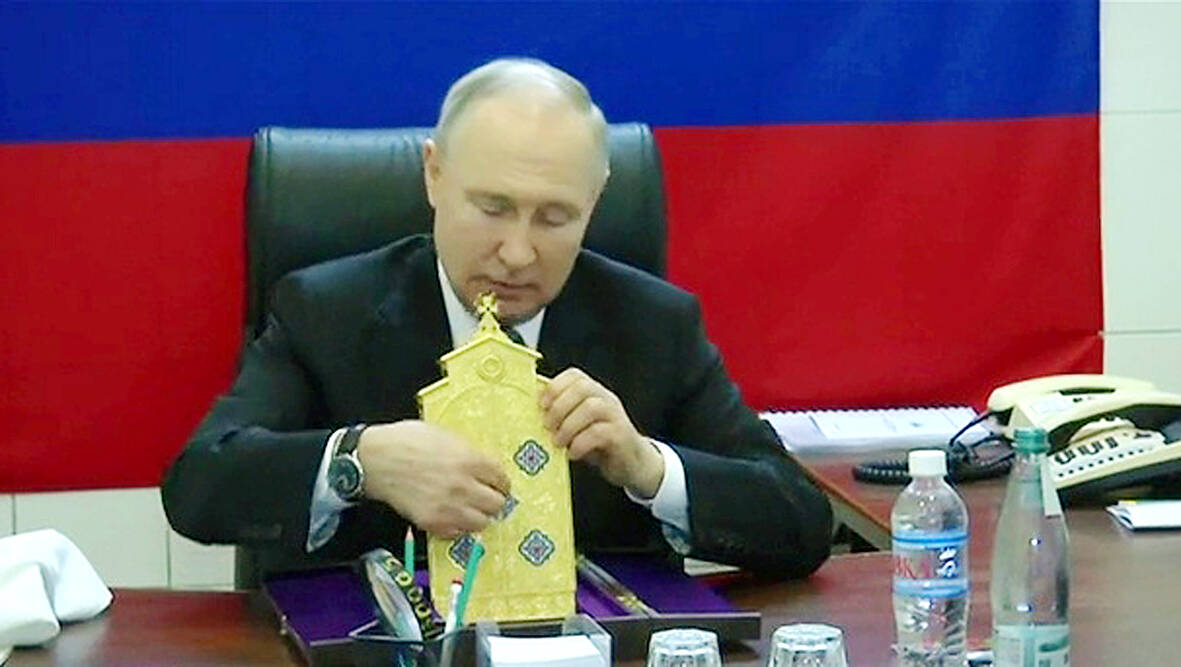Russian President Vladimir Putin visited command posts of the Kremlin’s forces fighting in Ukraine, officials said yesterday, as the war approaches its 14th month and Kyiv readies a possible counteroffensive with Western-supplied weapons.
A video released by the Kremlin and broadcast by Russian state television showed Putin arriving by helicopter at the command post of Russian forces in southern Ukraine’s Kherson province and then flying to the headquarters of the Russian National Guard in Luhansk province, which is in the east.
Kremlin spokesman Dmitry Peskov said the visits took place on Monday. The trip, Putin’s second in two months to Russian-occupied territory in Ukraine, represented an apparent attempt by the Russian leader to rally his troops and demonstrate his authority.

Photo: EPA-EFE / SPUTNIK / KREMLIN POOL
Dressed in a dark suit, Putin appeared to chair meetings with his military top brass during both of his stops. The locations of the military headquarters were not disclosed, making it impossible to assess how close they were to the front line. Nor was it possible to independently verify the authenticity of the video footage.
Ukrainian President Volodymyr Zelenskiy yesterday made his latest trip to positions near the front line to stiffen the resolve of soldiers battling Putin’s troops.
Zelenskiy visited units in Avdiivka, a city in Donetsk province where fierce battles are taking place, his office said. He heard first-hand reports about the battlefield situation and handed out awards.
Zelenskiy’s visits to areas of his country that have felt the brunt of Russia’s full-scale invasion gathered pace last month as he shuttled across the country, often by train. As with Putin, the Ukrainian leader’s wartime trips usually are not publicized until after he has already left an area.

CARROT AND STICK: While unrelenting in its military threats, China attracted nearly 40,000 Taiwanese to over 400 business events last year Nearly 40,000 Taiwanese last year joined industry events in China, such as conferences and trade fairs, supported by the Chinese government, a study showed yesterday, as Beijing ramps up a charm offensive toward Taipei alongside military pressure. China has long taken a carrot-and-stick approach to Taiwan, threatening it with the prospect of military action while reaching out to those it believes are amenable to Beijing’s point of view. Taiwanese security officials are wary of what they see as Beijing’s influence campaigns to sway public opinion after Taipei and Beijing gradually resumed travel links halted by the COVID-19 pandemic, but the scale of

TRADE: A mandatory declaration of origin for manufactured goods bound for the US is to take effect on May 7 to block China from exploiting Taiwan’s trade channels All products manufactured in Taiwan and exported to the US must include a signed declaration of origin starting on May 7, the Bureau of Foreign Trade announced yesterday. US President Donald Trump on April 2 imposed a 32 percent tariff on imports from Taiwan, but one week later announced a 90-day pause on its implementation. However, a universal 10 percent tariff was immediately applied to most imports from around the world. On April 12, the Trump administration further exempted computers, smartphones and semiconductors from the new tariffs. In response, President William Lai’s (賴清德) administration has introduced a series of countermeasures to support affected

Pope Francis is be laid to rest on Saturday after lying in state for three days in St Peter’s Basilica, where the faithful are expected to flock to pay their respects to history’s first Latin American pontiff. The cardinals met yesterday in the Vatican’s synod hall to chart the next steps before a conclave begins to choose Francis’ successor, as condolences poured in from around the world. According to current norms, the conclave must begin between May 5 and 10. The cardinals set the funeral for Saturday at 10am in St Peter’s Square, to be celebrated by the dean of the College

CROSS-STRAIT: The vast majority of Taiwanese support maintaining the ‘status quo,’ while concern is rising about Beijing’s influence operations More than eight out of 10 Taiwanese reject Beijing’s “one country, two systems” framework for cross-strait relations, according to a survey released by the Mainland Affairs Council (MAC) on Thursday. The MAC’s latest quarterly survey found that 84.4 percent of respondents opposed Beijing’s “one country, two systems” formula for handling cross-strait relations — a figure consistent with past polling. Over the past three years, opposition to the framework has remained high, ranging from a low of 83.6 percent in April 2023 to a peak of 89.6 percent in April last year. In the most recent poll, 82.5 percent also rejected China’s